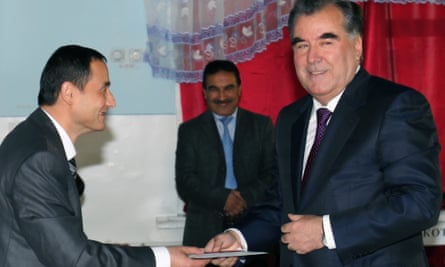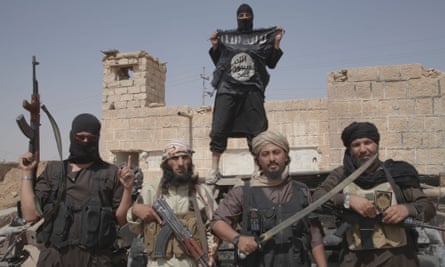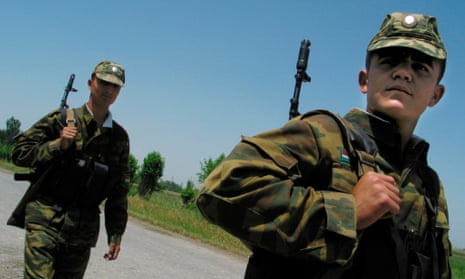The senior Tajik police commander who defected to Islamic State (Isis) was trained in America on five separate occasions, a US State Department official has said.
Colonel Gulmurod Khalimov, the head of the Tajikistan special forces unit known as Omon, claimed in a video released by Isis that he had travelled to the US three times for counter-terrorism training, including with the private military firm Blackwater.
The claim has been confirmed by the State Department. “From 2003-2014 Colonel Khalimov participated in five counter-terrorism training courses in the United States and in Tajikistan, through the Department of State’s Diplomatic Security/Anti-Terrorism Assistance program,” spokeswoman Pooja Jhunjhunwala told CNN.
Omon has been one of the key elements of US security cooperation with Tajikistan, which has focused on training and equipping the country’s special forces.
Even before this alleged defection to Isis, these training programmes were controversial: while the special forces are Tajikistan’s most capable units and are used to combat genuine security threats, they are also a key element of President Emomali Rahmon’s repressive rule, and have been implicated in indiscriminate force in suppressing internal opposition.
In 2012, Tajikistan’s leading opposition figure, Muhiddin Kabiri, said: “I was recently in the airport in Istanbul and met 15-20 of our Omon troops who were returning from training in the US. I asked them about this training, and they said it was very good. I hope they will learn not only new military approaches but about human rights, how to protect people, how to protect human rights, the role of these kind of units in a democratic country.”

Counter-terrorism training
What was taught in these courses that officers such as Khalimov took part in?
In the video announcing his defection, the Tajik commander said: “Listen, you American pigs: I’ve been to America three times. I saw how you train soldiers to kill Muslims,” he said. “You taught your soldiers how to surround and attack, in order to exterminate Islam and Muslims.”
It’s not clear which courses Khalimov participated in, but thanks to diplomatic cables released by Wikileaks there is some indication of what US special forces soldiers taught their Tajik counterparts.
In a 2009 diplomatic cable, the US embassy in Dushanbe wrote: “We undertook a number of training events [in 2008] in which the units successfully demonstrated the benefits of training in later operations... We developed counter-terrorism capacity within the Ministry of Internal Affairs Omon unit used for Swat and other emergency response operations.”
In another 2008 cable, the embassy wrote: “Critical training tasks that the Tajik National Guard, border guards, and Omon squads have requested include the following: staff organisation and planning, orders production, mission analysis and the military decision making process, intelligence preparation of the battlefield (IPB), direct action (raids and ambushes), special reconnaissance, close quarters combat/battle (CQC/B), sniper/observe operations, military operations in urban terrain (MOUT) ... tactical communications and basic combat life saving.”
In briefing slides, the US embassy also reported that it supplied “equipment and weaponry for Omon”.
Threats to Russia
Omon also provided protection for the American embassy in Dushanbe. In 2013, US Ambassador Susan Elliott tweeted a photo of herself with two special forces officers, adding: “Thanks to Omon for their support to keep our embassy safe and secure.”
So what does this mean given Khalimov’s defection to Isis? Probably not much in operational terms, but it does paint a damning portrait of the US’s longtime support for the country’s repressive state apparatus, writes John Heathershaw, a political scientist who studies Islamic militancy in Tajikistan.
“By providing considerable military training to Tajikistan’s security services during the regime’s crackdown on the [opposition] Islamic Revival Part … the US government has associated its counter-terrorism efforts with this campaign. [S]uch military assistance is likely to be counter-productive and should be stopped.”
“Khalimov has now become the poster child for the folly of US military assistance in Central Asia,” he said.

In another commentary on the Khalimov affair, Russian Central Asia expert Arkady Dubnov writes that the importance of Khalimov’s references to the US (in his video) have been exaggerated, and argues instead it’s his threats towards Russia which are more significant.
“It’s understandable that propaganda produced by Isis can’t do without a threat against the US in particular and western democracy in general.
“It’s much more telling that in the video Russia is so openly and sharply blamed and that Tajik ‘brothers’ working there should stop being ‘servants’ of the Russians, and instead only ‘servants of Allah’.”Russia has, to a greater degree than the US, been talking up the threat of Isis in Central Asia. And there is a widespread belief in Russia that Isis is an American creation – though this doesn’t seem to have been publicly expressed by Russian officials.
This affair will certainly do a lot to add fuel to those conspiracy theories. While Khalimov also had military training in Russia, the emphasis he makes on the US could bolster the belief in Moscow that Washington is an untrustworthy partner in war on terror in Central Asia.

Comments (…)
Sign in or create your Guardian account to join the discussion